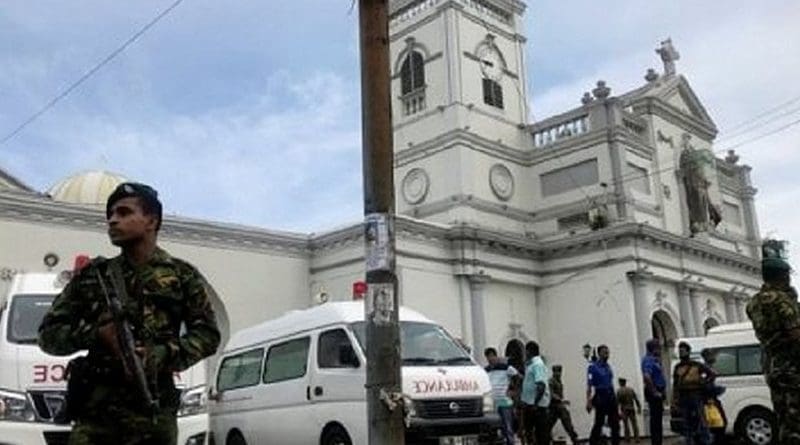Sri Lanka: Catholics Demand Justice For Easter Sunday Victims
By UCA News
Catholics in Sri Lanka have protested after a stone was allegedly thrown at a statue of St. Sebastian at a church where more than 100 people died in the Easter Sunday terrorist attacks.
Police and soldiers were deployed to Katuwapitiya on Aug. 6 when about 100 protesters gathered outside St. Sebastian’s Church to demand justice for victims of the April 21 atrocity.
Villager Antony Sebastian said a tense situation occurred after the statue was attacked by an unknown group.
“The glass case of the statue was cracked but the statue was not damaged,” he said.
Relatives of Catholics who died on Easter Sunday demanded immediate action and justice for their loved ones.
“Catholics want an impartial commission with the representation of all parties to investigate the attacks [on Easter Sunday]. Catholics have no faith in the government-appointed commissions since there is no transparency with regard to the suicide bombings,” said Sebastian.
Sebastian said some religious leaders, including extremist Buddhist monks, had used the terrorist attacks for their personnel benefit in the run-up to elections.
“The government should ensure that such tragedies will not take place hereafter and we need that assurance,” Sebastian told ucanews.com. “There was a serious lack of responsibility on the part of the government.”
Cardinal Malcolm Ranjith and several priests visited Katuwapitiya to calm the situation.
“Different groups are conspiring to create uncertainty in the country at this moment and they are behind the deadly Easter bombings. Please be careful,” Cardinal Ranjith told protesters outside the church. “I stand with you, my people. We want the truth and to seek justice. I want justice for my people.”
On July 31, Cardinal Ranjith refused to meet presidential candidates until investigation reports on the Easter Sunday attacks were handed over. He criticized both the government and opposition leaders.
He also recently accused the government of not having a backbone and demanded its resignation.
The Colombo Archdiocese has received 400 million rupees (US$2.25 million) from local and foreign donors for a relief fund set up after the attacks. A total of 71 million rupees has been spent as immediate relief, while 102 million rupees will be allocated for a scholarship program to fund 226 children until they complete primary education.
Attacks by suicide bombers on three churches and three luxury hotels killed 258 people on Easter Sunday. Authorities have blamed local jihadist group National Thowheed Jamath (NTJ), which is linked to the so-called Islamic State group.
On Aug. 5, police arrested three NTJ members who had allegedly received weapons training. The government and security forces have been blamed for not acting to halt the attacks after receiving intelligence warnings weeks beforehand.
Several mobs targeted mosques, Muslim-owned businesses, vehicles and homes in several cities on May 13. Some incidents occurred during a government-imposed curfew.
“We very much fear for our safety. Muslims now fear the thought of even stepping outside their homes. Some families are scared to return to their work and are not sending their children regularly to school,” a Muslim businessman told ucanews.com.
The United States issued a warning on Aug. 2 for its citizens to exercise caution when visiting Sri Lanka. Similar warnings have been issued by countries including China, India, Bangladesh and Myanmar.

